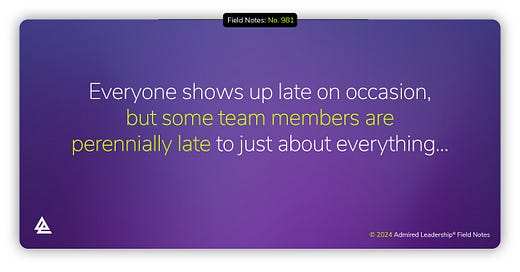Everyone shows up late on occasion, but some team members are perennially late to just about everything. Late to meetings. Late for travel. Late for appointments. Late for work.
Once this pattern takes hold, it can be very hard to break and can be highly consequential not only for the team member, but also for the leader’s credibility.
No one deliberately wants to be late or to disregard the importance of being on time, but that does not erase the friction caused by their lateness. Consistent lateness creates unspoken disappointment, perceptions of rudeness, and an unfair double standard in the minds of those colleagues who commit to being on time.
Leaders who accept or tolerate a team member’s chronic lateness unintentionally punish those who are on time. The implicit discord this creates can undermine the seriousness of the work, task, or meeting, leaving the leader wondering why team members don’t respect or adhere to other team rules and expectations.
Leaders who accommodate lateness for one team member unintentionally send a symbolic message to the team that common courtesy and team rules don’t apply equally to everyone. This small acceptance has huge implications for team trust and cohesiveness and quickly erodes the leader’s credibility.
Chronic lateness can’t stand.
Exploring with this person why they are always late and seeking a remedy is where good leaders start. But it normally doesn’t make the point strongly enough or resolve the issue.
Complicating matters even more, chronically tardy team members are often the most optimistic people on the team. Colleagues like them for their positive energy and can-do spirit. In fact, it is their optimism that often leads them to be late, as they commonly misjudge the time it will take to complete a future task.
But a team member with a well-earned reputation for lateness must be dealt with. This starts with an understanding that being on time is completely within the team member’s control. From there, good leaders make it clear that lateness reflects one of two essential problems. Either the team member believes what the team is doing is not important to them, or they believe it is important to them but fully acknowledge the team can’t depend or count on them.
When confronted with that reality, the offending party will either figure out how to be on time or admit the only other answer is to find another workplace to act irresponsibly in.
Good leaders hold everyone to the same standards and rules. No exceptions, even for star players.





I disagree with a hardline stance on tardiness, if it is not more than 15 minutes or so. Team members are all fallible people, but they all have their individual strengths as well. Often, the team member who arrives late is also the team member who stays late.
I encourage my team to be respectful and appreciative of each other's strengths and kind but empowering about weaknesses or failings. Each team member is noted for their individual contributions, so no one is seen as a weak link. People are encouraged to ask questions in private when they feel something is unfair, and the response is always to point out the value that each brings and the understanding in some way that they, themselves, receive.
It's a delicate balance, but each employee is precious and valuable to our team.
Good morning,
This is a difficult one for me.
One of my rules is punctuality. Greg McKeown mentions time fallacy/planning fallacy in his perennial work (in my opinion) essentialism (McKeown. 2014). Since then I do my best to multiply the time it'll take me to get to work by two. I have found this to be somewhat helpful.
As we know and have discussed, things are seldom black and white. Good aspiring leaders must learn to think in the grey (Sample. 2002). When health issues rear up or other factors come up, some companies are less understanding than others. This is where organizations, especially managers show their worth. We also see who's a leader and who is merely a manager.
Thanks for your time.